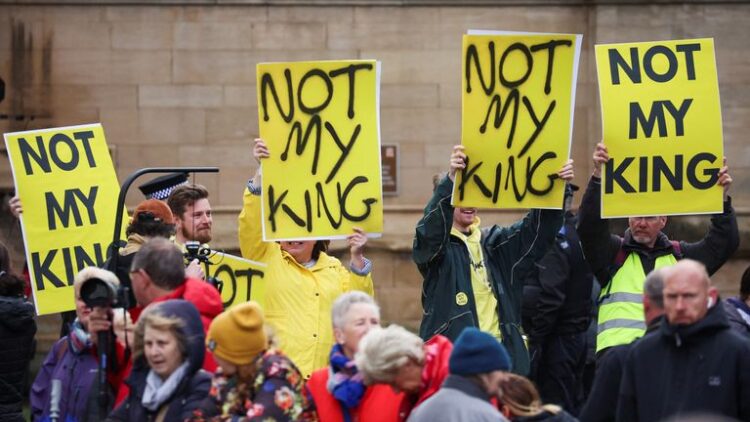By Ben Kerrigan-
Obstructive protesters will be jailed under new legislation rushed in to signal a clear message to
The UK Home Office has issued a letter to police chiefs across the country warning of new anti-protest laws that are being rushed through Parliament ahead of the King’s Coronation. The letter states that the proposed laws will give the police more powers to clamp down on protests that are deemed to be disruptive or causing a public nuisance.
The Home Office’s Police Powers Unit wrote to the campaign group Republic saying new powers had been brought forward to prevent “disruption at major sporting and cultural events”.
The new law, given royal assent by King Charles II on Tuesday, means that from Wednesday will mean protesters who block roads, airports and railways could face 12 months behind bars.
Anyone locking on to others, objects or buildings could go to prison for six months and face an unlimited fine.
Police will be able to head off disruption by stopping and searching protesters if they suspect they are setting out to cause chaos.
“I would be grateful if you could publicise and forward this letter to your members who are likely to be affected by these legislative changes,” says the Home Office letter, which lists the creation of a number of new criminal offences under the government’s much criticised public order bill.
The Home Office claims that the timing of the laws is coincidental. But lawyers have told Republic that the letter could be viewed as intimidatory, days before planned demonstrations in central London around the coronation.
Graham Smith, the campaign group’s chief executive, described the letter as “very odd” and said the group was seeking assurances from the police that nothing had changed in relation to its plans to protest on coronation day.
“We have been in direct contact with liaison officers and have met with senior commanders, who we have been very clear with about what we intend to do. Their response is that they are happy for us to proceed. But this letter has come out of the blue,” Smith said.
“Lawyers who we have been in touch with agree it sounds like intimidation and we are currently waiting for assurances from police nothing has changed.”
Republic has been planning protests on Saturday under the banner “Not My King”, including one at the statue in Charing Cross of Charles I, who was beheaded in 1649, leading to a short-lived republic.
However, those who plan to assemble to celebrate the King’s coronation are also entitled to Freedom Of Assembly under the Human Rights Act, and have the right not to have their peaceful enjoyment disrupted.
The new laws have been met with criticism from civil liberties groups, who argue that they represent a significant threat to the right to peaceful protest. In particular, concerns have been raised about the potential for the laws to be used to target legitimate protests, and the lack of transparency around how the new powers will be applied.
The Home Office has defended the proposed laws, arguing that they are necessary to prevent disruption and protect public safety during the Coronation. The letter sent to police chiefs states that the laws will be used to prevent protesters from blocking roads, disrupting public transport, or causing damage to property.
Stifling Of Dissent
However, critics have pointed out that the new laws may be overly broad, and could be used to stifle dissent and limit freedom of expression. They argue that peaceful protest is a fundamental right in a democratic society, and that any restrictions on this right must be proportionate and necessary.
One of the key concerns is that the laws may be used to criminalize peaceful protest, by giving the police more powers to disperse gatherings and arrest protesters. This could have a chilling effect on free speech and democratic participation, by making it more difficult for people to express their opinions and challenge the status quo.
The rush to push through these new laws before the King’s Coronation has also been criticized. Some have argued that the government is using the event as an excuse to crack down on dissent and limit protest, in order to present a sanitized and controlled image of the country to the world.




